The Impact of Makeup on Mental Well-being: Boosting Confidence
In today’s society, makeup has become an integral part of most individuals’ daily routines. Whether it is a simple touch of foundation or a full-face glam, applying makeup has evolved into an art form that enhances our appearance and boosts our confidence. However, beyond just the physical transformation, the impact of makeup on mental well-being is often overlooked but crucial to acknowledge. In this blog post, we will delve into the profound effect that makeup can have on boosting confidence and ultimately improving mental health.
First and foremost, let’s address the notion that wearing makeup is solely about conforming to society’s beauty standards. While it is true that societal pressures and unrealistic beauty ideals do exist, it is essential to recognize that the use of makeup can go beyond these external factors. Makeup serves as a tool of self-expression, allowing individuals to project their unique personalities and creativity onto their faces. Whether it be experimenting with vibrant eyeshadow colors or playing around with bold lipsticks, makeup gives people the power to define themselves on their own terms, promoting a sense of authenticity and individuality.
Moreover, the act of applying makeup can be a therapeutic and empowering experience. Taking the time to pamper oneself and engage in self-care rituals like skincare routines and makeup application can significantly impact one’s mental well-being. Transforming a bare face into a canvas adorned with colors, brushes, and cosmetics can instill a sense of mastery and control over one’s appearance. This sense of control helps individuals build self-esteem, as they actively participate in enhancing their own beauty. By realizing that they possess the skills to create and manipulate their own image through makeup, individuals can boost their confidence and develop a positive perception of themselves.
The psychological impact of makeup extends beyond the momentary act of application. Wearing makeup can affect how individuals perceive themselves throughout the day. Research suggests that individuals who wear makeup report feeling more confident, capable, and self-assured compared to those who do not wear makeup. By altering one’s physical appearance to align with their desired self-image, makeup can serve as a tool for self-affirmation. Consequently, this positive self-perception can influence how individuals interact with others, leading to improved communication and social interactions.
Furthermore, makeup has the ability to alleviate certain insecurities individuals may have about their physical features. Concealing imperfections, such as acne scars or blemishes, can help individuals feel more comfortable and at ease in social situations. The newfound confidence derived from such transformations can lead to increased assertiveness and reduced anxiety. When individuals feel more secure about their appearance, they are likely to demonstrate a greater willingness to engage in social activities and form meaningful connections, positively impacting their mental well-being.
It is crucial to note that the impact of makeup on mental well-being is not limited to its effects on the individual wearing it. Makeup also plays a role in how others perceive and interact with individuals wearing it. Studies have shown that individuals who wear makeup are generally perceived as more attractive, competent, and confident by others. The positive judgments received from others can reinforce an individual’s self-confidence and contribute to a sense of acceptance and belonging.
However, it is important to maintain a balanced perspective on the relationship between makeup and mental health. While makeup can undoubtedly boost confidence, it is essential to remember that self-esteem should not solely rely on external factors. Emphasizing the importance of a well-rounded approach to mental well-being, individuals should cultivate self-acceptance and focus on developing self-esteem from within, rather than solely relying on external tools like makeup.
In conclusion, makeup has a profound impact on mental well-being by boosting confidence and promoting self-expression. Beyond the physical transformation it provides, makeup serves as a therapeutic tool that allows individuals to express their creativity and define their own beauty standards. Through the act of application, individuals gain a sense of control over their appearance, leading to enhanced self-esteem and positive self-perception. Moreover, makeup can alleviate insecurities and contribute to improved social interactions. However, it is crucial to remember that balance and self-acceptance should be prioritized in maintaining mental well-being. Ultimately, makeup should be seen as a tool rather than a sole determinant of confidence and self-worth.

